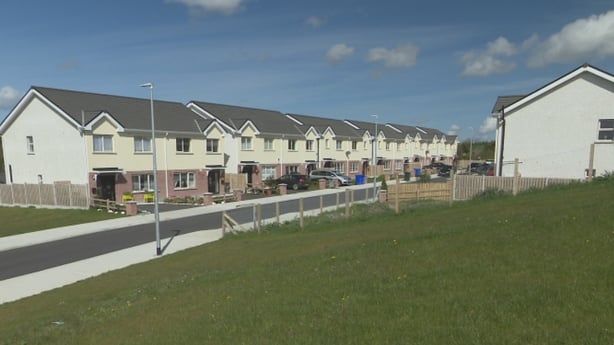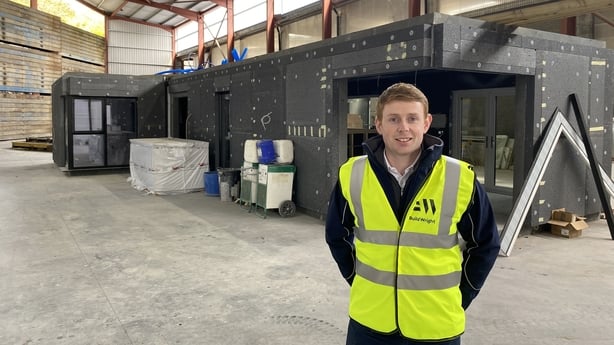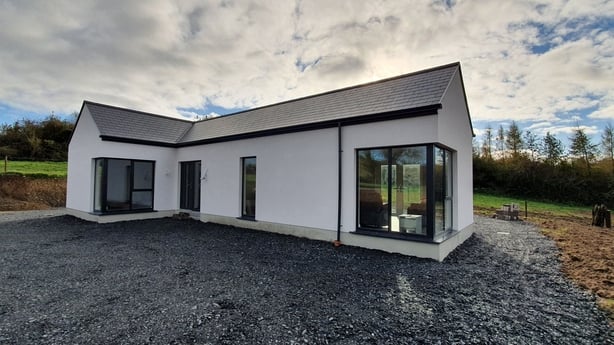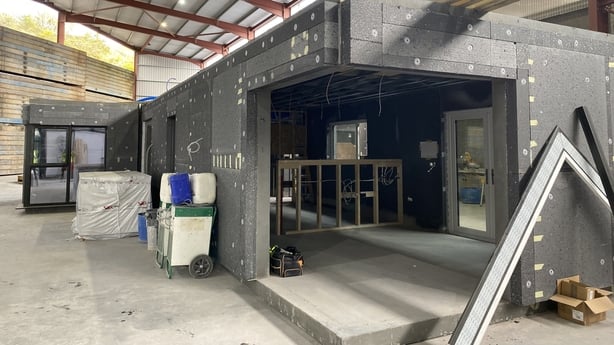The first residents of new modular homes being built to house Ukranian refugees are expected to move in this June.
It was initially planned that the first rapid build homes for this purpose would be installed by last November.
The Department of Integration said that the timeline for installing the homes at a number of sites around the country had been "recalibrated", because of its experience evaluating sites, engaging with communities beside the chosen sites and the timescale for manufacturing homes.
It said that this was a "new accommodation strand which has had to be developed from scratch" and that the preparation of the sites had taken more time and more work than originally planned.
The Office of Public Works (OPW), who is responsible for the delivery of the homes before they are handed over to the Department, said it was proceeding with the project "as fast as possible and that the first homes will be installed on a phased basis" over the coming months.
It said that a need for remediation, as well as challenges providing utility services had affected the time frame.
Work is under way on seven sites around the country, and units have started to be delivered.
A development of 28 homes at a site on the Farnham Road in Cavan will be one of the first to be completed, along with a development of 64 units in Mahon in Cork.
It is now expected they will be ready to be handed over to the Department by the end of May or early June, with the first residents able to move in from the middle of June.
The OPW said that this timescale was still subject to any further issues with construction, a number of which already arose over the past few months around site conditions and remedial works.
Work to identify residents for these homes is ongoing.
The Department of Integration has said that each home is set to cost an average of €145,000, including construction, transport and installation, but that the full cost of the programme is "subject to site enabling costs".
The Government has approved the construction of 700 rapid build units for this purpose as part of its overall response in providing accommodation.
This plan has the potential to house up to 2,800 people in family units of four people.
61,000 fleeing Ukrainians sought State accommodation
More than 70,000 people from Ukraine have come to Ireland after fleeing the war, and more than 61,000 of them have sought accommodation from the State.
So far, locations in Cavan town, Mahon in Co Cork, Thurles, Sligo town, Claremorris in Co Mayo, Rathdowney in Co Laois and Clonminch in Co Offaly are being progressed.
While the Government is using these modular homes in its efforts to address the accommodation shortages for Ukranian people, this type of home is also seen as a housing solution for both private individuals building their own homes, and in the provision of social and affordable housing.
Approved Housing Body Clúid, who delivers social and affordable housing on behalf of the State and local authorities, has already built a number of housing schemes using modular or rapid built housing.
One such development of 34 houses is located on the outskirts of Cavan town.
More lean construction to fast-track delivery
Acting Chief Commerical Officer Eibhlín O'Connor said that the use of modular could be a "massive benefit" in providing housing quicker.
"It is faster, if you can deliver the sites, you can turn a scheme like this around in less than 12 months, whereas traditional procurement could take three years and typically takes three years to deliver", she said.
Ms O’Connor said that this type of home is not cheaper than traditional construction methods, but that "typically, they should be much faster to deliver".
But she said the speed depended on having land available and serviced, and having "all stakeholders working together to deliver the project".
Ms O’Connor said that the homes on the scheme in Cavan "arrived on site almost like Lego blocks. The upper floor was clipped on, and the roof clipped on."
She said there was a perception that modular was substandard housing, but she said that was not the case and Clúid has been working directly with manufacturers.
"Some of the benefits would be, they are finished to a very high quality in the factory. We have had very little defects, so from Clúid’s point of view it is beneficial for lifecycle maintenance repairs costs, if we have little or no defects"
"They come fully complete with bathrooms and kitchens fully finished. A heating system and electrics all complete when they’re attached."

The exteriors of the houses are then completed by a contractor on site.
"You wouldn't know when you're sitting in the house that they're any different to a traditional house", she said.
Clúid Housing already has a few hundred modular homes on its books, and this will continue to grow.
It has two pilot schemes in Wexford and Laois working directly with manufacturers to design and construct them.
"We are increasing our capacity, as we see there is an issue with labour and supply chain shortages. It is a much more lean construction to fast-track delivery".
Ms O’Connor said that the use of modular could have a massive impact on housing delivery, but that it "needs to scale up".
"We don't have enough manufacturers in this country, we should also be looking internationally and to the UK or increasing Government investment in the manufacturing of modular housing", she said.
Delivery time frame 'pretty compressed'
One such manufactuer is BuildWright, based in Co Monaghan.
The third generation family business progressed from quarry products to concrete over the years, with the modular side of the business starting in 2018.
They are manufacturing new-build homes for people all over the country, as well as apartments for the hospitality and leisure sector and office space for small businesses, all from a factory floor in Monaghan.
Managing Director of BuildWright Stephen Wright said of their product, that "like any other concrete built home, it’s a forever home, it just happens to be built in a different way".

He said that the delivery time frame was "pretty compressed" compared with traditional construction.
For a three-bedroom home, Mr Wright said that the manufacturing cycle in the factory was about eight to ten weeks.
"The time on site could be another four to eight weeks on site, depending on the complexity of the build. We have a little bit of lead in time on the front-end, which can vary between three to four months. So, in total it could be six to nine months from order to occupancy", he said.
Mr Wright also said that this method provided more budget certainty, and that their rates were competitive with traditional construction.
"Sometimes speed can be the hook and it is important for people. It's that degree of certainty a lot of people go for, also the convenience factor as it is less disruption on site and its a lot easier for us to control that and make it hassle free when we are doing it here in the factory."
He said that modular homes could provide certainty to the wider delivery of homes.

Mr Wright said; "anything offering a bit of certainty to the sector is a good thing. When we take on a project, we know the timeline and the budget and we can return that to the customer. That’s pretty sought after at the moment in the current climate".
He said that he is anticipating growth in this area.
On the factory floor in Monaghan, the units are manufactured in a seven-week cycle. Once assembled, various trades are involved in plumbing, plasterboarding, painting and fitting out.
"They’re virtually complete internally, and most of the work on site is external".

The modules are transported on the back of a lorry to the site, where the external facade and roof is completed, and services connected.
"We’ve been west, south, north and east, we are covering across the country", he said.
Housing for All
The Department of Housing said that it is working with local authorities to accelerate the delivery of social housing, including through the use of design build "Modern Methods of Construction" (MMC) - which includes prefabricated and modular build units.
So far, 850 social homes have been delivered using MMC up until the end of Q3 in 2022 and a further 3,000 units are in the pipeline.
"The Department will continue to work with local authorities to maximise delivery through this mechanism", it said.
It said that local authorities have been advised that MMC should be adopted where appropriate to deliver social housing projects on local authority land.
An update to the Housing for All plan published last November includes targets for increased use of MMC in public housing.
The Department said that MMC has been identified as a key measure to address increased housing delivery and that the co-ordination of activities to promote its adoption is being led by the Department of Enterprise.
All new dwellings must comply with building regulations, building control requirements and achieve a 60-year durability for all key elements.






